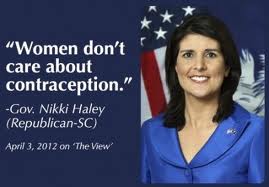
I am saddened by the news that South Carolina’s governor has chosen a path of scientific and medical ignorance and vetoed a bill that would have provided young girls free access to the HPV vaccine, which is recommended for girls as young as 12 to head off the possible transmission of HPV (which causes the majority of cervical cancers) before they are most likely to become fully sexually active [1].
I have written about the scientific issues related to this vaccination before and merely link to my comments. I have nothing new to add. A vote against HPV vaccination is an abandonment the sound science that says that the HPV Vaccine improves the quality of life for the majority of women.
“Anecdont”: http://steve.cooleysekula.net/blog/2011/09/17/anecdont/
I merely quote from myself:
“We see that due to the nature [diseases like polio and pertussis (whooping cough)], we have acted as a people to develop and distribute vaccination for diseases that kill far fewer people than are killed by cervical cancer.
…
Primary evidence gathered in randomized, double-blind trials shows that one of the two approved vaccines for HPV, Gardasil, is not only efficacious (90% success rate in preventing infection by HPV) but safe (no significant difference between placebo and the vaccine in studies of side effects). There is no additional data that clearly links rarer complications to the specific vaccine. The risk associated with taking the vaccine is small (35 million vaccinations given with no evidence of serious side effects, suggesting a life-altering complication probability of <0.000003%) compared to the fact that death from cervical cancer results in 0.001% of the population.
…
The recommendation about the age of vaccination stems from a couple of pieces of data: how many vaccinations are needed to receive complete protection and when a young woman typically becomes sexually active. The CDC has statistics on sexual activity [17]. For instance, by age 15 about 8% of women engage in oral intercourse and 26% of women engage in vaginal intercourse; rates are similar for young men. At age 14, 5.7% of young women claim to have had sex. According to the Kaiser Family Foundation [18], the median age at which first experience with sexual intercourse occurs is about age 16; that means 50% of young girls have their first sexual intercourse BEFORE age 16. If prevention is the goal, the vaccine has to be administered at an age before which the majority of sexual activity occurs.
[Texas Governor] Perry’s executive order followed the recommendations of the CDC: begin the vaccination process at age 12 because it takes about 1 year to receive all three recommended vaccinations. That means full protection from HPV occurs at around age 13. That assures that young girls are protected against HPV by the time they become sexually active.
That’s the science that informs the policy discussion.”
[1] http://tfninsider.org/2012/06/20/south-carolina-governor-vetoes-hpv-vaccine-bill/
[17] (Ref. 17 from the post I linked to above is the CDC statistics on women and the frequency of sexual activity at different ages. This is the science that informs the decision about when to vaccinate for HPV) http://www.cdc.gov/nchs/data/ad/ad362.pdf and “Teenagers in the United States: Sexual Activity, Contraceptive Use, and Childbearing, 2002″ (PDF). Vital and Health Statistics. National Center for Health Statistics. 2002. Retrieved 2008-04-29.
[18] Again, this is a reference from my previous essay on this subject, “Anecdont.” http://www.kff.org/youthhivstds/upload/U-S-Teen-Sexual-Activity-Fact-Sheet.pdf

